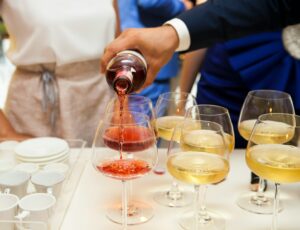Embarking on a wine tasting adventure, whether in the lush vineyards of Napa Valley or a cozy local wine bar, is a dream for many wine enthusiasts like me. It’s an opportunity to immerse yourself in the world of wines, discovering new flavors and expanding your palate. However, the prospect of navigating the unspoken rules of wine tasting can be daunting for both seasoned collectors and newcomers alike. That’s where understanding the basics of wine tasting etiquette comes into play. It’s not just about savoring the wine; it’s about respecting the craft and those around you.
From knowing what to do before you even take your first sip to gracefully moving on to your next tasting wines, mastering these etiquettes enhances the experience for everyone involved. Let’s dive into the essentials of wine tasting etiquette, ensuring your next wine journey is as smooth as the wines you’re about to enjoy.
Wine Tasting Etiquette Tips
When I step into the world of wine tasting events, I know I’m entering a realm where tradition meets taste. Wine tasting etiquette isn’t just about sipping and savoring from a wine glass; it’s about appreciating the art and respecting the craft. First impressions matter, especially when you’re visiting renowned vineyards or cozy wine bars. As I’ve learned, dressing appropriately signals respect for the establishment and fellow tasters in most wineries. It’s not about donning a ball gown or a tuxedo, but rather choosing smart-casual attire that matches the setting’s ambiance.
Before I even think about letting a drop of wine touch my lips, I make sure to greet the hosts. A simple hello and a smile go a long way in showing appreciation for their work. It’s also crucial to keep an open mind. Even if I’m a seasoned wine collector, every tasting room has something unique to offer, and every pour deserves my undivided attention.
Understanding the sequence of wine tasting enhances the experience. Starting with lighter, more delicate whites before moving on to robust reds ensures that my palate isn’t overwhelmed. It’s not just about flavor, though. The ritual of observing the wine’s color, swirling to release its aromas, and then finally tasting, teaches me to appreciate each wine’s complexity and craftsmanship.
When it’s time to transition to a different wine, I’ve learned that it’s polite to finish or dispose of any remaining wine in my glass into a spittoon. It’s not a faux pas; it’s respecting the next tasting. Asking questions about the wine’s characteristics or the winery’s history not only enriches my knowledge but also shows the hosts their efforts are valued.
Engaging in wine tasting is more than exploring varied flavors; it’s a journey into understanding and appreciation. Every sip I take is a nod to centuries-old traditions, the dedication of winemakers, and the vibrant community of fellow enthusiasts.
Dress Code
Appropriate Attire
When it comes to diving into the world of wine tasting, the question of what to wear often pops up in my mind. Comfort and appropriateness are my top priorities when I’m selecting my outfit for such an occasion. I always check in advance if the winery or tasting room has any dress code recommendations. It’s surprising how much this can vary – some places prefer a more formal approach, while others welcome a casual vibe. This little piece of homework helps me blend in and respect the venue’s culture.
Comfort isn’t just about feeling good in what I’m wearing, it’s also practical. Wine tastings often involve a fair amount of standing, walking, and possibly even touring vineyard grounds. So, choosing comfortable shoes is non-negotiable for me. I’ve learned the hard way that sore feet can distract from the experience. Similarly, I aim for clothes that allow me to move freely, ensuring that tight or constricting garments are left at home. Weather plays a big role too. If it’s hot, I opt for light, breathable fabrics; if it’s cooler, layers are my go-to solution.
Additionally, I’ve found that wearing dark colors is a strategic choice. Not only do they look sleek, but they’re also more forgiving of any accidental wine spills – a not uncommon occurrence even among seasoned tasters. Keeping accessories, like jewelry and scarves, minimal reduces the risk of them dipping into my glass or snagging on something as I move around.
Avoid Strong Perfumes
One of the most crucial pieces of advice I’ve absorbed over the years is to avoid strong perfumes or aftershaves when heading to a wine tasting. The essence of wine tasting lies in the ability to capture and appreciate the wine’s aromas, which can be overshadowed by overpowering personal scents. I’ve noticed that even sitting near someone doused in perfume can detract from the experience, making it hard to discern the subtle notes in a glass of wine.
Wine experts have even advised me against using scented lotions or hair products on the day of a tasting. I’ve taken this advice to heart, opting for unscented deodorants and skipping scented hair products. The difference it makes is remarkable. Without competing fragrances, the natural, complex aromas of the wine shine through, allowing for a fuller appreciation of its character.
Moreover, consuming strongly flavored foods or smoking just before a tasting can also impact my ability to enjoy and evaluate the wine accurately. By avoiding these activities, I ensure that my palate is as clean as possible, ready to pick up on the delicate flavors and aromas that each wine offers. This not only enhances my tasting experience but also shows respect for the winemakers’ efforts and the intricate nuances of their creations.
Tasting Room Behavior
When visiting a winery, it’s easy to get caught up in the excitement of trying new wines and exploring beautiful vineyards. Yet, it’s crucial to remember that our actions can greatly enhance or detract from both our experience and that of others around us. Let’s dive into how we can maintain respectful conduct and the benefits of using tasting journals during these visits.
Respectful Conduct
In the peaceful setting of a tasting room, every guest’s behavior contributes to the overall atmosphere. Maintaining a respectful conduct means keeping our voices at a polite level so that everyone can hear the winemaker or staff member leading the tasting. These experts often share valuable insights about the wines, which can be easily missed amidst loud conversations. As much as we’re there to enjoy, it’s important to remember that wine tasting is an educational experience as well.
Wine tasting etiquette extends beyond verbal interactions. It includes the physical aspects of tasting as well. For example, it’s okay to spit wine into the designated spittoons if we’re looking to taste without consuming too much alcohol. This practice is not frowned upon but rather seen as a sign of a seasoned taster who wishes to remain clear-headed through multiple tastings.
Additionally, although it might be tempting to wear our favorite perfume or cologne, it’s best to avoid wearing strong fragrances. These scents can interfere with the wine’s natural aromas, not just for us but for those around us, potentially spoiling the tasting experience.
Using Tasting Journals
Moving on to an equally important part of wine tasting etiquette, let’s talk about Using Tasting Journals. I’ve found that bringing a small journal or notebook to a tasting can significantly enhance the experience. Not only does it allow me to jot down my thoughts on the wines I’m trying, but it also serves as a great conversation starter with the staff and fellow wine enthusiasts.
Here’s why I believe tasting journals are invaluable:
- Track Preferences: It helps me remember which wines I enjoyed the most and why. This is especially helpful when I want to purchase a bottle to enjoy at home.
- Learn and Grow: Writing down tasting notes encourages a deeper engagement with the wine, prompting me to pay attention to the nuances of aroma, flavor, and texture.
- Educational Tool: Over time, my tasting journal has become a personalized educational tool, reflecting my journey and growth as a wine lover.
By maintaining a respectful conduct and making use of tasting journals, we’re not just ensuring a pleasant visit for ourselves but also for those around us. It’s about fostering an environment where everyone can learn, appreciate, and celebrate the art of winemaking. Whether you’re a seasoned wine connoisseur or a curious newcomer, these practices will undoubtedly enrich your wine tasting experience.
Interacting with Staff
When embarking on a wine tasting journey, a significant part of the experience is engaging with the knowledgeable staff at each winery. Their expertise and insight can greatly enhance your appreciation of the wine while educating you about each varietal’s unique characteristics. Here’s how to make the most of your interactions.
Asking Questions
I’ve found that asking questions is not just encouraged; it’s essential. Whether it’s about the winemaking process, the history of the vineyard, or specifics about the wine you’re tasting, showing curiosity reflects well on you. No question is considered foolish in the realm of wine tasting.
In fact, it demonstrates an eagerness to learn and deepen your understanding of wine. I always make it a point to inquire about the origin of the wine, the type of grapes used, and any recommended pairings. This not only broadens my wine knowledge but also makes the tasting a more interactive and memorable experience.
Accepting Recommendations
Accepting recommendations from the tasting room staff can lead to delightful discoveries. Remember, these professionals have a deep understanding of their offerings and can suggest wines that align with your preferences or challenge your palate in exciting ways. Be open to trying something new; you might just find a new favorite. I’ve often been pleasantly surprised by wines I wouldn’t have chosen for myself but ended up loving after a staff member’s suggestion. Moreover, this openness fosters a positive interaction with the staff, making your visit more enjoyable and informative.
By engaging with winery staff through thoughtful questions and being open to their recommendations, you’re not only enriching your own wine tasting experience but also honoring the expertise of those who have a passion for sharing the world of wine.
Embracing the art of wine etiquette isn’t just about following rules; it’s about diving deep into the culture of wine. By engaging with winery staff, asking insightful questions, and being open to new experiences, I’ve discovered that wine tastings can be much more than sipping and swirling.
They’re an opportunity to expand my palate, enrich my knowledge, and connect with the passionate people behind the labels. Remember, every sip is a story, and by adopting a respectful and curious approach, we’re not just tasting wine—we’re experiencing it. So, let’s raise our glasses to making every wine tasting an adventure in learning and enjoyment even in wine country.


